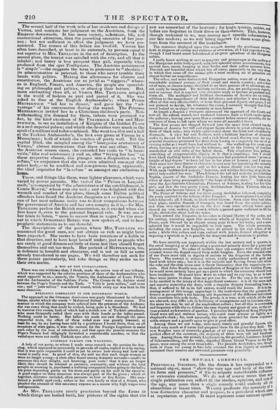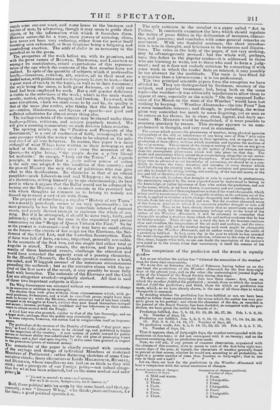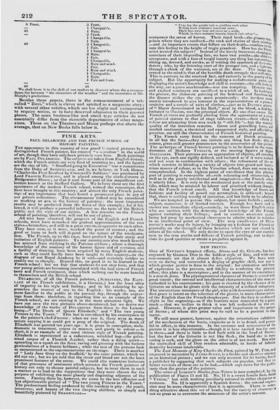THE MON:HLY CHRONICLE.
PERIODICAL literature, like the drama it has superseded tss national object, must "show the very age and body of the tiene, its form and pressure," if itis to acquire considerable influence or extensive circulation. We do not of course mean that any single publication can reflect all the studies, opinions, and actser the age, any more than a sitgle comedy could embody all Its absurdities or lesser vices. We only predicate the necessity of s true distinctive character and 'expose, to a periodical which.aris at reputation or profit. It must represent some current opiate% supply some curient want, and come home to the business nnd booms of men, by advancing, though it may seem to guide their objects, or by the information with which it furnishes them. However successful for a time, mere powers of amusing, alone, bare never yet been very enduring, either from the power itself becoming soon exhausted, or from laughter being a fatiguiug and unsatisfying exertion. The utile et duke is as necessary to the periodical as to the poem. The prospectus of the work before us, with its premises, and with the great names of BULWER, BREWSTER., and LARDNER as
amongst its contributors,taised expectations of this represen- tation of the age which the contents of the first number have not realized. In spite of the quantity of subjects which it professed to bandle,—literature, criticism, art, science, all in their most ex- tended sense, with politics and contemporary history to boot,—there is great want of variety in the topics, as well as in their treatment ; the style being the same, in both great divisions, as if only one hand had been employed for each. But a still greater deficiency is visible in the substance of the work ; which in the main wants
novelty, matter, strength, thought, and freedom. In a word, with some exceptions, which we shall come to by and by, its quality is that of the mere fine writer, who thinks that the forms of his art—similes. illustrations, and figures of speech—are good and sufficient substitutes for almost every thing else.
The leading coutents of the number may be classed under three beads,—pulitics, criticism, and science populaily treated. We will give a running commenters on each division taken seriatim.
The opening article, on the 4. Position and Prospects of the Government," is a sort of confession of faith, intermingled with sonic passages which the writer wishes to be adopted as the poli- tical cresd of all true believers. In matter, this paper is a mere rkhange of what Whigs have written in their newspapers and talketl. at their dinner-tables ever since the accession of the Queen,—its alpha being, " the people desire a ,palicy liberal but moderate ; its omega, " keep out the Tories.' As regards principle, it maintains that a ju8te milieu course of action is the only one adapted to the condition of this country ; and the present Ministry the only class of politicians who can give effect to this desideratum. Its character is that of an official pamphlet—mock Liberalism and real Whiggery; its sty le, that of a rhetorician, stilling himself up to ape statesmanship; its best point is where it argues that the Ballot would not be advanced by turning out the Miliistiy ; its merit consists in the practised tact with which thoughts so common as to belong to nobody are dressed up to carry a sort of air with them.
The proptiety of introducing a regular " History of our Times" into a mumble periodical, seems to us very questionable ; for it must generally be too late for the immediate interest of current events, and rarely distant enough to embrace the whole of any filing. But if it be attempted, it should be done truly, fairly, and judiciously; which is not the case in the superficial and partial commentary on the " Reign of Queen Victoria the First." So far as the present is concerned—and they may have no small effects on the future—the events of her reign are the Elections, the Set- tlement of the Civil List, and the Canadian Insurrection. Each of these was full of facts, cut ious, important, generally accessible. In the accounts of the first two, not one single fact either total or singular is stated. The causes, the motives, and the possible results of these historical events, challenge the attention and would have rewarded the sagacity even of a passing chronicler. In the Monthly Chronicle, the Canada question contains a brief, one•sided, and Whiggish resume of the notorious circumstances preceding the outbreak ; but as the narrative closes with the ar- rival of the first news of the revolt, it may possibly be more fully dealt with hereafter. The rationale of the Elections and the Civil List are altogether avoided—regularly shirked. All that is said of these two important subjects is this— The Whig Government was reinstated without any announcement of change in its measures or addition to its strength. The election thus took place without those circumstances which, with go. octal prudence, forbearance, and a wish to conciliate peace, might have been made to favour it ; while the Mioistry, whose attention had of late been chiefly occupied with struggles at Court, (where they now found themselves tranquil and secure,) became, perhaps, too confident and too lukewarm in their endea-
vours to obtain success with the People. • • • A Civil List was also granted, similar to that of the late Sovereign, and on a larger scale, perhaps, than the public may eventually approve. In some respects, however, the nation had to congratulate itself on improve- ments.
The particulars of the revenue of the Dutchy of Cornwall, "that great mys. tery," as Lord Coke called it, were to he cleared up, and published in future for the inspection of the country. A new system or public reward for public service or eminent ability was eubstituted for the old plan of pensioning Court favourites; and a fair and open inquiry (?) at the same time granted in respect to the present recipients of national money. The remainder of the paper is chiefly occupied with accounts of the sayings and doings of individual Members or ei-devant Members of Parliament ; rather flattering sketches of some Con- servative chiefs ; fancy characters of Lords MELBOURNE, Russets, and DURHAM, whose excellences are laid on as thick as they will stick; and a panegyric of our foreign pulicy—not indeed altoge- ther for wl.at has been achieved, but onthe more modest and safer princi " rlis not in moitals to conesand success, But we'll do mere, Sempronius, we'll deserve it." Both these political articles seem by the same hand, and that, ap- parently, some " literary Whig," who thinks fusle-milieuisne felt the time, a good political specula:lat. The only criticism in the number is a paper called " Art in Fiction." It succinctly examines the laws which should regulate
the writer of prose fiction in the delineation of manners, charac- ters, and passions; and concludes with some general remarks on sentiment. With one doubtful sentence, the short introduc- tion is true in thought, and felicitous in its instances and illustra- tions. The rules in the body of the paper, if not eery striking, may be advantageously perused : but the whole will, perhaps, have this defect to the popular reader—it is addressed to those who are learning to write, not to those who read to form a judg- ment ; and as it does not embody criticism by connecting it with some work in which the reader feels an interest, it may possibly be too abstract for the multitude. The topic is less fitted for a magazine than a lecture-room; it is too professional.
The two principal scientific papers form the exception we have alluded to. They are distinguished by freshness, mastery of the subject, and popular treatment; but, being both on the same
topic—the weather—it was editorially injudicious to allow them to appear at once, especially as the article " On the supposed Influ- mice of the M000n on the state of the Weather " would have lost nothing by keeping. " Weather Alinanacks—the late Frost " has a more immediate interest ; and though, in preluding, the writer gives way somewhat too much to mere fingering, yet as soon as lie enters on his theme, he is clear, close. logical, and dryly sar- castic. Mr. MURPHY would be demolished, if it were possible to overturn quackery by reason. This passage appears to us com- prehensive in thought, and very neat in statement.
The causes which govern the phenomena of weather, being physical agencies independent of the will or interference of any being save of Him " who rules the sterol," are as fixed and as certain in their operation, and as regular in the production of their effect., as those which maintain and regulate the motions of the scdar system. The moment of the i ising or setting of the sun on any given day ot the ensuing year, is thezefole, in the nature of things, not more certain than the atmospheric phenomena which till take place on that day. The doubt and uncertainty which attend these events belong altogether to our antici- pations of them, and not to the things themselves. hour knowledge of meteor- ology were as advanced as cur knowledge of astronomy, we should be in a con- dition to declare the time, duration, awl intensity of every shower which shall fall during the ensuing year, with as much certainty and precision as we are able to foretell tho ri.itig, setting, and southing of the sun and moon, or the rise and fall of the tides of the ocean.
When it is said, theiefore, that drought or rain is expected to predominate, the uncertainty implied by the term expected must be understood to belong to the knots ledge, or rather ignorance of him who snakes the prediction, and not to the event, which, as we have shown, is necessary and uot contingent. But the most absurd of these explanations is that of the word changeable, which is Lel e used in a most nos el sense. Changeable weather, in the in dinary use of the avoid, is applied to weather which changes frequently and suddenly, at short in- tervals, from fair and clear to cloudy and wet. But the weather-almanack sense of this term is, weather in whieli it is uncertain whether drought or rain will predominate. Now, as we have already shown that no uncertainty can attend the weather itself, but that the uncertainty belongs only to the mind of the author of the Wcath.r ...lbnanack, it will be, necessary to remember that changeable weather is weather about %%hid, the said author confesses that he has no foreknowledge. Thus, though for a week the face of the heavens continue clear and cloudless, the temperature of the air mild and uniform, and the alma. sphere calm and still, yet the weather during such week might be changeable according to the Weather Almanac/c, aud its author would claim the credit of a predictien fulfilled. In fact, every (lay in the year to which he has annexed the word changeable must fulfil his prediction, whatever be the state of the wea- ther, since, happen what will, no one can doubt the uncertainty of the author's own mind as to the event, when that uncertainty is itself the essence of his prediction.
This compaiison of the prediction and the event is equally gcod- Let us see whether the author has "followed the sinuosities of the weather" even for three days successively. We write this on Saturday the 17th of February, having before us on the one hand the predictions of the Weather Almanach for the first forty.eight days of the present year, and on the other the meteorological journal kept by order of the Council of the Royal Society during that time. We shell resolve these forty.eight (lays into three classes : first, those on which the weather fatfilled the prediction ; second, those on whirls the weather did not fal.fit the prediction ; and third, those for which no prediction was made, which, as we have already shown, is the case of all those days to which changeable is annexed. In deciding whether the prediction has been fulfilled or not, we have been careful to follow those explanations of his terms which the author has very pro- perly given in his preface; and where the character of the day, aa recorded in the journal of the Royal Society, has been doubtful, as compared with the pre- diction, we have given the author the benefit of it : Prediction fulfilled, Jan. 7, 8. 12, 13. 19, 20. 26, 27, 28. Feb. 1. 6. 9, 10. 13. Number of days, 14. Prediction not fulfilled, Jan. 1, 2, 3. 9, 10, 11. 15, 16, 17, 18. 24, 25. 30, 31. Feb. 3. 8. 12. 14. 16, 17. Number of days, 20. No prediction made, Jan. 4, 3,6. 14, 21, 2-2, 23. 29. Feb. 2. 4,3. 7. 11. 15. Number of days, 14.
Thus it appears, that, of forty.eight days, the weather corresponded with the prediction on fourteen ; it did not correspond with it on twenty; and on the fourteen remaining days no prediction was made. Now, we will ask, if any person of common observation, acquainted with the climate of this country, were to annex to each of the Met forty eight suc- cessive days of the year, at hazard, the characters of weather generally found to prevail at that season, whether he would not, according to all probability, be right in a greater number of cases than fourteen in forty-erght; that 31111, One
case in three and a half? " • • •
Let us, then, see how far the predictions in the Weather Abnanach will bear a comparison with the actual succession of changes.
Actual succession of changes. Succession of changes predicted. Numbcr of days. N umber uf days.
6 Mild and warm. 0 Frost.
14 Frost. 0 Changeable.
3 Thaw. 7 Frost, 4 Frost. I Changeable.
4 Thaw, 6 Frost.
6 Frost. 3 Changeable.
3 Thaw. 2 Rain.
8 Frost. 3 Frost.
1 Changeab!c. 48 1 Rain.
2 Frost.
1 Changeable. 1 Rain.
48 2 Changeable. Fair.
1 Changeable. 2 Rain.
1 Fair.
1 Changeable. 1 Rain and wind.
1 Fair.
1 Rain and wind.
1 Changeable.
1 Rain.
1 Fair and flog.
48 48 We shall leave it to the skill of our readers to discover where the carrespon• deuce lies between " the sinuosities of the weather " and the sinuosities of Mr. Murphy's predictions.
Besides these papers, there is the commencement of a tale called" Zicci," which is clever and spirited as a magazine story ; with several other articles, which are too slight and unimportant to require notice, or to have deserved admission in their present places. The more business-like and small type articles do not essentially differ from the chronicle departments of other maga- zines. Those on the Theatres and Music perhaps rise above the average, that on New Books falls below it.




























 Previous page
Previous page